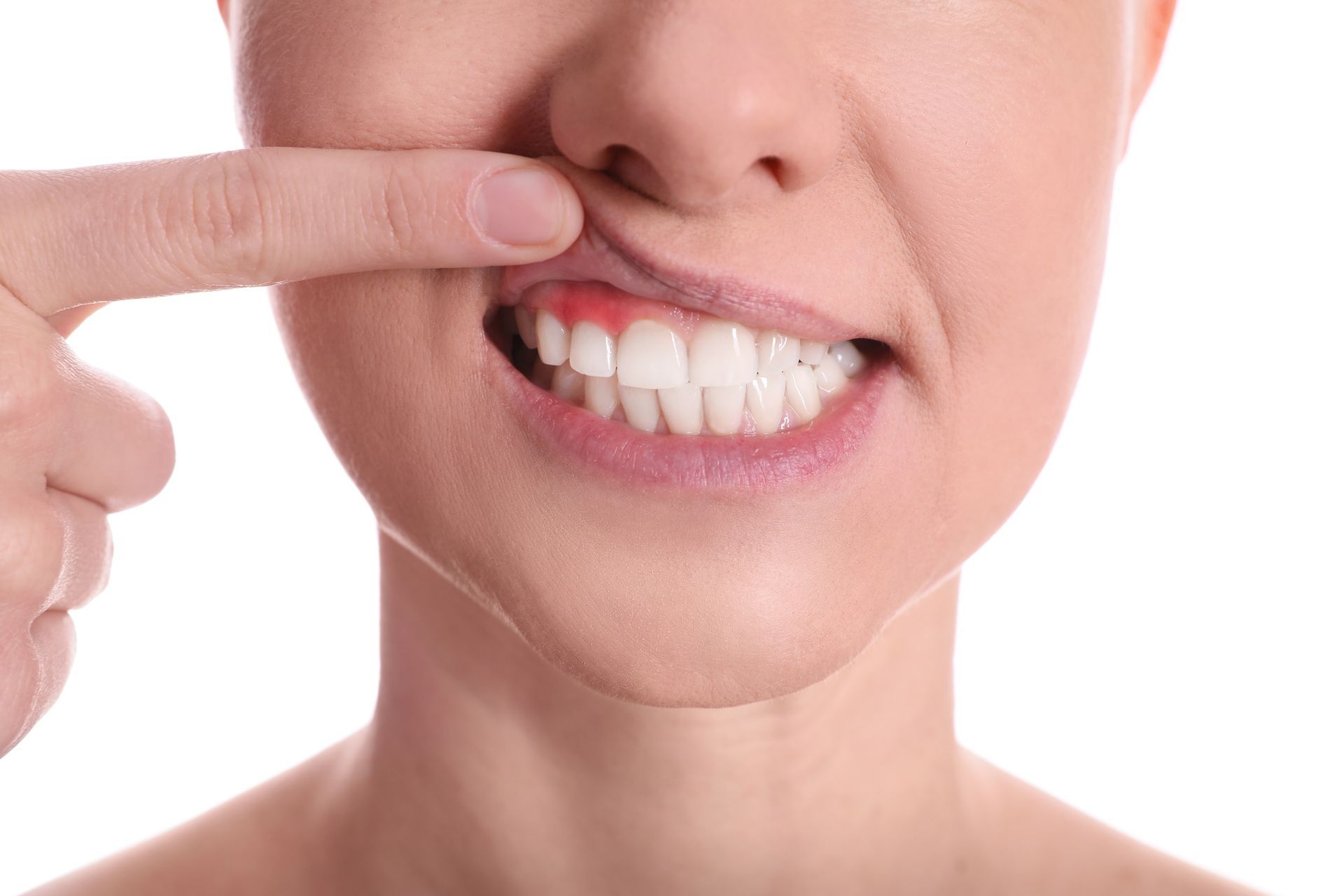Gum Disease/Periodontal Disease

Gum disease is the swelling or soreness of the gums around your teeth. Gum disease is caused by the bacteria present in plaque or the sticky substance that forms on your teeth. The bacteria in plaque produce toxins that can lead to gum inflammation, which causes our gums to become red and bleed when we brush or floss. If plaque is not removed effectively, it can cause the gums to pull away from our teeth and cause pockets in which more bacteria can collect. Plaque that is not removed can also harden or mineralize into hard calculus. These pockets and calculus are hard to remove with brushing and flossing at home and require help from a dentist with a professional dental cleaning. If left untreated, periodontal disease can develop and damage the structures that support our teeth, such as the bone.

All Periodontic services are provided by Daniel Indech DDS
Stage 1 - Gingivitis
The stage of gum disease that is reversible is called gingivitis. Gingivitis is caused by the bacteria found in plaque and causes our gums to become swollen, irritated and can cause our gums to bleed. Gingivitis only affects our gums and is reversible with proper brushing and flossing, as well as regular visits to the dentist for your cleaning.
Stage 2 - Early Periodontitis
The beginning of the periodontal disease is known as early periodontitis. This occurs when gingivitis is long-standing, and the inflammation progresses into the supporting structures of the teeth. Unlike gingivitis, the bone begins to become affected. In early periodontitis, the inflamed gums begin to pull away from the teeth due to pockets harboring bacteria. This persistent inflammation also causes bone loss around the teeth.
Stage 3 - Moderate Periodontitis
If early periodontitis is left untreated, it can progress to moderate periodontitis. Continued inflammation causes more destruction to the supporting structures of the teeth. More notable bone loss can cause the teeth to become loose.
Stage 4 - Severe Periodontitis
If moderate periodontitis is left untreated. It can progress to severe periodontitis: bone loss and tooth mobility increase. If you have severe periodontitis, you may experience pain while chewing, bad breath, and a bad taste in your mouth. Eventually, tooth loss will occur.
What should I do to prevent periodontal disease?
The signs of periodontal disease are not always easy to see and can be painless. The earlier periodontal disease is caught, the easier it is to treat.
- Brush with a soft-bristled toothbrush twice a day for 2 minutes. Also, clean between your teeth with floss daily. Get regular professional dental cleanings at least twice a year. This is the only way to remove the plaque that has hardened into calculus.
- Get regular professional dental cleanings at least twice a year. This is the only way to remove the plaque that has hardened into calculus.
- Do not smoke cigarettes or use other forms of tobacco, such as E-cigarettes. Tobacco use increases the risk of developing periodontal disease.
More advanced forms of periodontal disease will require cleanings beyond the gum, called deep cleaning. This is the only way to effectively remove the plaque or calculus present in the periodontal pocket.
The Mouth to Body Connection
Active periodontal disease is characterized by inflammation in the gums. The immune cells and the byproducts of the inflammatory cascade in the diseased, inflamed gum tissues can re-enter the bloodstream and travel throughout the body. Researchers have linked the presence of elevated levels of inflammatory cells, chemical mediators, and the waste byproducts of inflammation that are circulating in the bloodstream to several serious medical conditions. It is important to treat periodontal disease as early and quickly as possible to reduce inflammation to minimize elevated levels of harmful cells, chemicals, and hormones in the blood.
Heart Disease & Heart Attack
Recent studies have shown that people with periodontal disease are 2.7 times more likely to suffer a heart attack.
Stroke
Studies have also shown that people with periodontal disease are three times more likely to suffer a stroke.
Pre-Term Childbirth
Women with periodontal disease are 7-8 times more likely to give birth prematurely to a low birth-weight baby.
Diabetes
Periodontal infection can raise blood sugar in diabetic patients. Periodontal treatment often results in a reduced need for insulin.
Heart Disease & Heart Attack
Periodontal infection in the mouth can be breathed in and increase the severity of respiratory diseases such as pneumonia, bronchitis, and emphysema.
Periodontal Infection Is a Medical Problem
Periodontal disease is no longer thought to be just a dental problem. Researchers are finding many correlations between periodontal infection and serious medical problems.
Your Infection Can Be Transmitted
Research using DNA testing has found that 80% of all periodontal disease comes from bacteria transmitted from a parent or spouse. Patients with periodontal disease can pass their infection along to their loved ones.

Laser Treatments to Heal Your Gums
Laser treatment for gum disease and periodontal disease is a minimally invasive and effective way to treat gum disease. This treatment involves using a laser to remove the infected gum tissue and bacteria that cause gum disease. The laser also helps to stimulate the growth of healthy gum tissue, which can help to prevent the reoccurrence of gum disease. This treatment is less invasive than traditional gum surgery, which can mean less discomfort and a faster recovery time. Laser treatment for gum disease is a safe and effective way to restore the health of your gums and prevent the progression of periodontal disease.
Benefits of Laser Treatment
In addition to being minimally invasive, laser treatments for gum disease and periodontal disease offer several benefits. They are very precise, meaning that they can target the affected area without damaging surrounding tissue. They also promote faster healing as they stimulate the body's natural regenerative processes. Laser treatments are also less painful and require less downtime than traditional gum surgery. Additionally, they are effective in reducing inflammation and killing bacteria, which helps to prevent the spread of infection and reduce the likelihood of future gum problems. Overall, laser treatments offer a safe, effective, and efficient alternative to traditional gum surgery for patients suffering from gum disease and periodontal disease.




